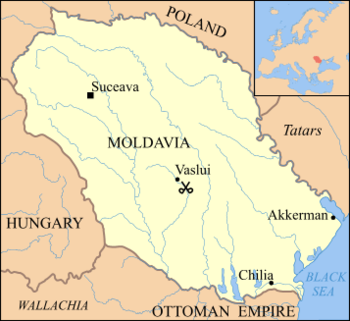Our website is made possible by displaying online advertisements to our visitors.
Please consider supporting us by disabling your ad blocker.
Battle of Vaslui
| Battle of Vaslui | |||||||
|---|---|---|---|---|---|---|---|
| Part of the Moldavian-Ottoman Wars, Ottoman-Hungarian Wars and the Polish-Ottoman Wars | |||||||
 Location of the battle | |||||||
| |||||||
| Belligerents | |||||||
|
Moldavia Kingdom of Poland Kingdom of Hungary | Ottoman Empire | ||||||
| Commanders and leaders | |||||||
|
Stephen III of Moldavia Mihály Fants[3] | Hadım Suleiman Pasha | ||||||
| Strength | |||||||
|
30,000–40,000 Moldavians according to the Polish Chronicle[4][5]
|
60,000–120,000 Ottomans according to the Polish Chronicle[7][8] 30,000 according to Kármán Gábor[9] | ||||||
| Casualties and losses | |||||||
| ~5,000 killed and wounded |
~40,000 dead[10] 4,000 captured[10] | ||||||
The Battle of Vaslui (also referred to as the Battle of Podul Înalt or the Battle of Racova) was fought on 10 January 1475, between Stephen III of Moldavia and the Ottoman governor of Rumelia, Hadım Suleiman Pasha. The battle took place at Podul Înalt ("the High Bridge"), near the town of Vaslui, in Moldavia (now part of eastern Romania). The Ottoman troops numbered up to 30,000 or 120,000, facing about 40,000 Moldavian troops, plus smaller numbers of allied and mercenary troops.[11]
Stephen inflicted a decisive defeat on the Ottomans, with casualties according to Venetian and Polish records reaching beyond 40,000 on the Ottoman side. Mara Branković (Mara Hatun), the former younger wife of Murad II, told a Venetian envoy that the invasion had been the worst ever defeat for the Ottomans.[12] Stephen was later awarded the title Athleta Christi ("Champion of Christ") by Pope Sixtus IV, who referred to him as "verus christianae fidei athleta" ("the true defender of the Christian faith").[13]
According to the Polish chronicler Jan Długosz, Stephen did not celebrate his victory; instead, he fasted for forty days on bread and water and forbade anyone to attribute the victory to him, insisting that credit be given only to the Lord.
- ^ Kármán & Kunčevic 2013, p. 266.
- ^ Ferencz Kállay (1850). Historiai brtekezés a' nemes székely nemzet' eredetéről: hadi és polgári intézeteiről a régi időkben
- ^ Ferencz Kállay (1829). Historiai értekezés a' nemes székely nemzet' eredetéről: hadi és polgári intézeteiről a régi időkben [Historical discourse about the origin of the 'magnanimous szekler nation' : military and civil institutes in the past times.] (in Hungarian). Nagyenyed, Hungary: Fiedler Gottfried. p. 247. Retrieved 9 October 2010.
- ^ Maciej Stryjkowski, "Kronika Polska", page 194
- ^ https://www.ceu.edu/sites/default/files/attachment/event/12612/artimonteodora.pdf
- ^ Kármán, Gábor; Kunčevic, Lovro, eds. (2013). The European Tributary States of the Ottoman Empire in the Sixteenth and Seventeenth Centuries. Leiden: Brill. ISBN 9789004246065.
- ^ Maciej Stryjkowski, "Kronika Polska", page 194
- ^ https://www.ceu.edu/sites/default/files/attachment/event/12612/artimonteodora.pdf
- ^ Kármán, Gábor; Kunčevic, Lovro, eds. (2013). The European Tributary States of the Ottoman Empire in the Sixteenth and Seventeenth Centuries. Leiden: Brill. ISBN 9789004246065.
- ^ a b Liviu Pilat and Ovidiu Cristea, The Ottoman Threat and Crusading on the Eastern Border of Christendom during Vaslui, (Brill, 2006), 149.
- ^ Kronika Polska mentions 40,000 Moldavian troops; Gentis Silesiæ Annales mentions 30,000 Ottoman troops and "no more than" 40,000 Moldavian troops; the letter of Stephen addressed to the Christian countries, sent on 25 January 1475, mentions 30,000 Ottoman troops; see also The Annals of Jan Długosz, p. 588;
- ^ Istoria lui Ştefan cel Mare, p. 133
- ^ Saint Stephen the Great in his contemporary Europe (Respublica Christiana), p. 141
Previous Page Next Page


